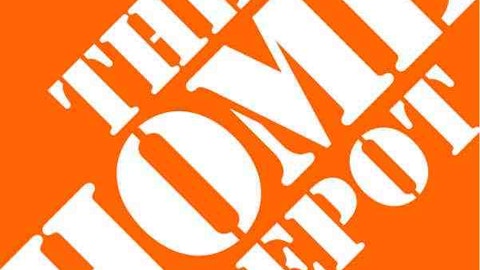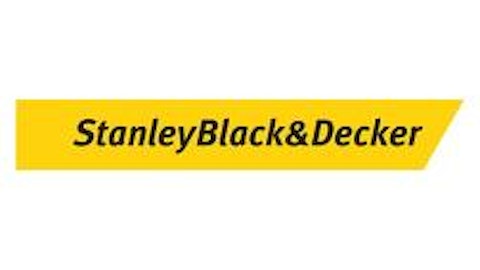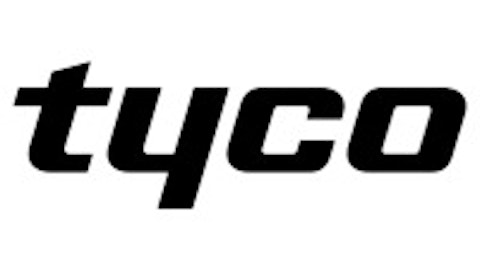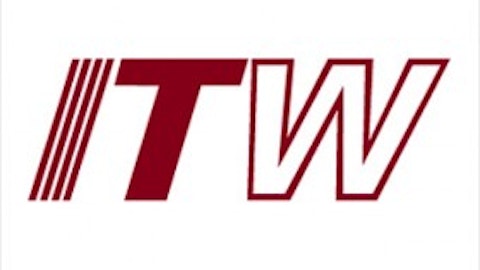The housing market has been on a gallop, which is why many may believe that the overall construction market is booming. This is not the case as the construction industry is a product of both residential and non-residential construction, and it has been the non-residential construction that has disappointed investors. The Architectural Billing Index (ABI), a leading indicator of non-res construction, hit a low level in April, according to Ingersoll-Rand PLC (NYSE:IR)’s presentation at the Electrical Product Group (EPG) Conference.
Sluggish institutional (another word for non-res construction) markets have been a source of dismay to the investors of security companies, as security system and technology providers are a pure play on non-res construction growth rates. Let’s have a look at what these companies had to say at the EPG conference.
A fire security company worth a look
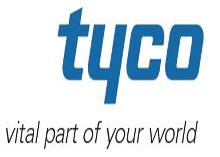
However, I am still bullish on the company. The management is continuously trying to innovate in order to curb softness in the non-res construction markets. The company has a strong reputation for turning around its operations.
It was once nothing more than a mess of different non-synergistic operations when Edward Breen took over the charge back in 2002. The new CEO spun off a collection of slow-growing business units and helped the company to half its debt in nine months. Tyco International Ltd. (NYSE:TYC) started the same initiative six months back in its North America security operations. There is another two-to-three months before this is totally reflected in the backlog.
On the capital allocation side, Tyco International Ltd. (NYSE:TYC) will continue to focus on bolt-on acquisitions ($200 million to $300 million would be on the larger side), a dividend payout in the 30% to 35% range, and share buybacks. The CEO did comment that the company would like to maintain its A- rating going forward. Hence, willingness to take on additional leverage seems minimal.
The security segment for this company grew at a higher-than-anticipated rate
Many don’t know that Stanley Black & Decker, Inc. (NYSE:SWK) has a security segment. This is because its performance has been overshadowed by the stellar results of its construction and do-it-yourself (CDIY) segment. As outlined in one of my previous posts, the CDIY segment is flying high given the growth in res-construction rates. However, I also pointed out in the same post that CDIY under-performed in the recent earnings period given that the outdoor season was pushed four weeks ahead of the anticipated time. This happened because of the colder weather.
The organic revenue for Stanley Black & Decker, Inc. (NYSE:SWK)’s CDIY segment was flat in the recent period, missing consensus expectations by 5.6% and decelerating on a two- and three-year stack by 1,100 bps and 1,200 bps, respectively. However, Stanley Black & Decker, Inc. (NYSE:SWK) reiterated full-year guidance for the CDIY segment, implying the company would recoup (not lose) those sales.
Now coming back to the security segment. The segment generated revenue of $599 million, which increased 1.2% versus 1Q12, beating the estimate of $588 million. Growth of 1% from acquisitions and 1% from favorable currency-rate movements were partially offset by a 1% organic decline. Organic growth of 3% in the North American Convergent Security division and 5% in the mechanical- access security segment was offset by a 5% organic decline in the European Convergent Security Solutions business.
Earnings before tax and interest (EBIT) of $62 million came in below the estimate of $71 million as margins of 10.3% in the segment missed the 12% estimate. EBIT margins were pressured in 1Q13 due largely to a negative mix in North America and the commercial-lock business as well as lower absorption in Europe. The company also identified $15 million in additional cost-cutting that it expects to realize later this year.
Overall, the stock remains a buy given that the bright future prospects of the CDIY segment will help the company to offset any weakness in its security business given that non-res construction continues to display sluggish growth.
This company plans to spin-off its security segment
Given the softness in the non-res construction market and the non-synergistic nature of the security business, Ingersoll-Rand PLC (NYSE:IR) decided to spin-off this segment last December. The security operation, which is responsible for making locks and steel door frames, represents the smallest division of Ingersoll Rand with annual revenue of just $1.5 billion in 2012, forming just 11% of the company’s total revenue of $14 billion for 2012.
The new standalone company will have about $2 billion in annual revenue with $1.6 billion in commercial security (dependent on the non-res construction markets) and $400 million in residential. The separation process is expected to be completed by the end of the year and a Form 10 Registration Statement is expected to be filed in mid-June. The management anticipates $150 million to $200 million in separation costs with the majority being professional consulting fees (banking, etc.) and restructuring charges.
The remaining part of Ingersoll will have about $12 billion in annual revenue with 68% coming from the sale of new equipment, and 32% coming from aftermarket revenue. The biggest end markets will be North America non-res at 30% of sales, 21% industrial, 17% overseas non-res, and 15% transport refrigeration.
On an overall note, with residential tailwinds, share buybacks ($2 billion over the next three-to-four quarters or 10%+ of current float), and activist involvement, downside is likely muted at current levels. However, near-term catalysts seem limited as the industrial markets have slowed and an upturn in the commercial markets is not likely until late 2013 or 2014.
Final word
Clearly, security businesses are facing tough times in North America given the current slowdown in the non-residential construction markets. Tyco International Ltd. (NYSE:TYC) is the only company that is a pure play on the growth in the security market. However, given a solid capital-allocation plan and strength in residential markets, I am bullish on Tyco. Stanley Black & Decker, Inc. (NYSE:SWK) has other growing segments that will help it to face the declining income in its security business.
Zain Abbas has no position in any stocks mentioned. The Motley Fool has no position in any of the stocks mentioned.
The article Are Security Companies a Safe Bet? originally appeared on Fool.com and is written by Zain Abbas.
Zain is a member of The Motley Fool Blog Network — entries represent the personal opinion of the blogger and are not formally edited.
Copyright © 1995 – 2013 The Motley Fool, LLC. All rights reserved. The Motley Fool has a disclosure policy.
